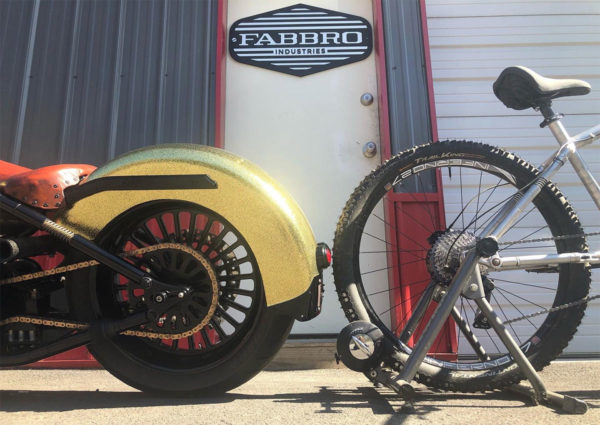An Entrepreneur on Two Wheels

The metal shop of Terence Musto ’10 is a crowded place, its 1,200 square feet crammed with equipment. Musto spends a lot of time there building and creating. “There is a thin film of metal dust everywhere,” Musto says. “It is somewhat unavoidable.”
Musto is the founder and CEO of Fabbro Industries, a self-described research and development company for anything on two wheels. In his Voorheesville, New York, shop, Musto has taken on a complicated, all-encompassing project, one attempting to blend design with comfort, beauty with practicality.
That project involves creating a new, sleek frame for motorcycles and bicycles, dubbed the Type 57x, that integrates a rear wheel suspension system. That suspension is essential for a smooth, comfortable ride, but too often with bikes and motorbikes, that suspension is sacrificed in the name of building a cleaner, streamlined look.
The balance between form and function is not an easy one to achieve, and Fabbro’s project had its doubters at first. “I’ve had engineers say to me, ‘This won’t work,’ ” Musto says. “It is a monumental undertaking. I’ve had to learn so much about suspension, engineering for vibration, vehicle dynamics, general high-level physics. I have read more textbooks than I’ve ever read in my life.”
Since then, the project has earned two patents, with a third pending, and Musto hopes that the frame for bicycles will be available soon, with the motorcycle frame to follow. Fabbro may only be a two-person shop (Musto’s sister, the other employee, helps with marketing), but it’s aiming to change the way riders take to the road. “My goal is for you to be able to go into a bike shop, or a Harley dealer, and have my frame on your bike,” he says. “You may not know my name. You may not know Fabbro Industries. But, when you go down the road, that’s our stuff you’re running. That is the goal.”
Musto’s journey to creating these frames has been a long and winding one, but he’s thankful that he has had his Babson education to lean on along the way.
A Career Spent Building
Musto first grew interested in working with metal and machines in the sixth grade, when he watched a TV show on Jesse James, a builder of custom motorcycles. “As soon as I saw those bikes, I wanted to do that,” he says. “I was totally enamored.”

Fabbro Industries is creating a new, sleek frame for motorcycles and bicycles, dubbed the Type 57x, that integrates a rear wheel suspension system.
After that, he persuaded his parents to let him buy a blowtorch, and, in high school, he helped a neighbor who worked on repairing snowblowers and lawnmowers. “He taught me a ton,” Musto says. “I can take a snowblower apart with my eyes closed probably.”
In college, Musto paid $50 for a Kawasaki motorcycle with a blown engine and another $50 for its service manual and went to work on it in his parents’ garage. “I am never getting my garage back,” his father told him. Eventually, Musto got the motorcycle to start. “That feeling—I took this junk pile, and it was alive again,” he says. “I was hooked.” After that, he began building his own motorcycle from scratch in the garage. “I would get in bed at night and wake up at like 2 a.m. and think, ‘Let’s go,’ ” he says. “I wanted to get out there.”
When he ultimately decided to continue working with motorcycles after graduation, instead of pursuing a more traditional business path, his parents weren’t pleased. “I had a job offer. I turned it down,” he says. “They were like, are you out of your mind?” A career spent in an office, though, wasn’t what he wanted. After working for a Long Island motorcycle builder to learn more about the trade, Musto opened Fabbro in 2013.
Pivots and Priorities
Since then, Fabbro has undergone several pivots, chasing the best money-making opportunities for the business. When it opened, for instance, it focused on Musto’s passion of making custom motorcycles, but he came to realize that finding customers to buy expensive motorcycles wouldn’t be easy. “There is a very small group of people who want that. It is definitely a niche market,” he says. “I had to adapt.”
Then Fabbro began to focus more on prototyping parts, not just for motorcycles, but also for home construction, interior design, athletic training, and a host of other uses. “We can take you from hand sketch to prototype,” Musto says. Fabbro also began fabricating items for the home, such as tables, bottle openers, ash trays, and keg handles. “It’s a good little revenue stream,” he says.
“Knowing how to pivot to where the money is—that is all stuff Babson helps with. Babson gave me the analytical ability to be prepared for the business side of things.”
Terence Musto ’10, founder and CEO of Fabbro Industries
The chief focus nowadays, however, is on one part, namely those frames he’s developing for motorcycles and bicycles. Musto credits his Babson education for helping him through the many twists and turns of his business. “I attribute that 100 percent to Babson. Knowing how to pivot to where the money is—that is all stuff Babson helps with,” Musto says. “Babson gave me the analytical ability to be prepared for the business side of things.”
Musto’s education can surprise others, who may make assumptions about him because of his appearance (he has a long beard) and the fact that he works in a metal shop. “Most people don’t expect me to keep up with the business side of the conversation,” he says. That know-how has allowed him to take his passion, something he once toiled away at in his parents’ garage, and make a business out of it.
“The whole thing is trying to take the thing I love and create something of value for other people,” he says. “If you do that, you have a business.”




